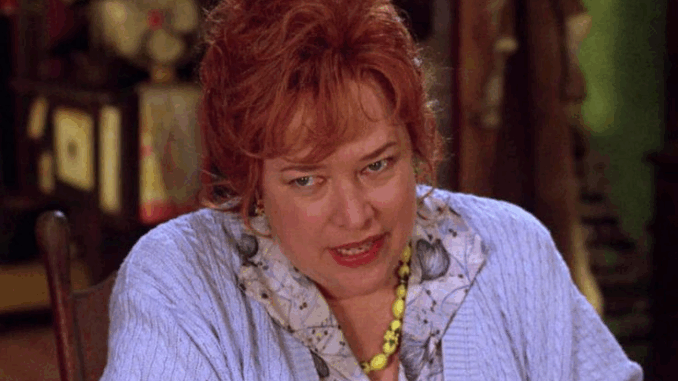
The Invisible Woman in a Shrinking World
Evelyn Couch is, at first glance, an ordinary woman. Middle-aged, married, and increasingly isolated, she blends into the background of her own life. Her husband barely listens. Her body is changing, her confidence eroding, and society treats her as if she’s past her prime. In many ways, Evelyn represents every woman who has ever felt herself fading into irrelevance.
When we meet her, Evelyn is on autopilot—making her way through the grocery store, listening to motivational tapes in her car, and silently stewing in frustration. She tries, in her own way, to reclaim control—through diets, affirmations, and cheerleading her marriage back to life—but nothing sticks. Her life is stagnant, her spirit dulled. And then she meets Ninny Threadgoode.
A Spark Ignited by Storytelling
The turning point in Evelyn’s life isn’t a dramatic event—it’s a story. Or rather, a series of stories, lovingly told by Ninny during their visits at the nursing home. Through tales of Idgie and Ruth, of friendship, freedom, and rebellion, Evelyn begins to see a different way of being. These aren’t just quaint anecdotes; they’re blueprints for reinvention.
The stories awaken something in her—a hunger, a sense of possibility. Ninny becomes both mentor and mirror, reflecting a version of womanhood Evelyn had never imagined. It’s not about age, weight, or obedience. It’s about boldness. About being seen. Evelyn doesn’t just absorb these lessons—she begins to live them.
Towanda the Avenger: A Comic Alter Ego or Something More?

One of Evelyn’s most iconic transformations comes in the form of her alter ego: Towanda. At first, Towanda is a joke—an imaginary persona she uses to talk herself into courage. But the more Evelyn invokes her, the more real she becomes. Towanda is rage. She’s justice. She’s every time Evelyn swallowed her feelings or was told she was too much or not enough.
The infamous scene where Evelyn smashes the young women’s car in the parking lot—declaring “I’m older and I have more insurance!”—is a comedic high point. But it’s also a cathartic moment for countless women who’ve been conditioned to apologize instead of assert. Towanda isn’t just funny; she’s necessary. She’s Evelyn’s voice, finally unmuted.
Reclaiming Power Through Small Acts
Evelyn’s transformation doesn’t happen overnight, nor does it involve sweeping changes. Instead, it’s marked by small, deliberate choices. She starts saying no. She stands up to her husband. She eats what she wants without guilt. She paints her bedroom. She takes up space—in her home, in her conversations, and most importantly, in her own mind.
These shifts might seem trivial, but they’re revolutionary in context. Evelyn was taught to shrink—to be polite, to defer, to serve. Her rebellion is in rejecting that conditioning. By the end of the film, she’s not just different—she’s awake. And once a woman wakes up, she can’t be put back to sleep.
Evelyn Beyond the Credits – A Life Reimagined
What might Evelyn’s life look like after Fried Green Tomatoes? It’s not hard to imagine her becoming a motivational speaker, a blogger, or a community leader. She might run workshops for women navigating midlife transitions, or volunteer at women’s shelters. She might travel, write, or even open a café of her own.
But perhaps the most powerful part of Evelyn’s story is that she didn’t need to change the world. She just needed to change herself. And by doing so, she gave others permission to do the same. Evelyn’s arc is about reclaiming identity, rewriting narrative, and realizing it’s never too late to start over.
